Are You Achieving the Goals You Want to Achieve with Your Music?
Have you ever had any of these things happen with your music?
- You wrote a song you felt was really strong, but it just didn’t get the response you hoped for. You were thinking it would be the song to propel you to greatness, but it never happened.
- You had a song that people told you they loved, but still no one actually bought it or told their friends about it.
- You submitted a song to a radio station or for placement in a TV show or film, but never heard back from anyone, leaving you to believe your song wasn’t up to their standards.
- You posted your song to a social media site, thinking you’d get a ton of great feedback, but hardly anyone commented on it at all. And if someone did, it was one of your friends.
- Or maybe you’ve written a great song that had some success, but you haven’t been able to recreate that experience for yourself. (By the way, if that’s the case, you probably lucked into what works without understanding what it was. That’s why you weren’t able to make it happen again.)
If you’ve experienced any of these scenarios you may just need to know the specific elements that most successful songs have in common. After all, those elements are what’s making them appealing to listeners. Writing something that’s “cool” is one thing, but to have it be something desired by a lot of people is a something entirely different.
The great part is you can incorporate these elements into your music without compromising yourself as an artist. You might be afraid that if you learn or apply certain techniques to your music, your songs will be too cookie cutter. You don’t have to worry about that. There are plenty of approaches you can use that will make your music better, without forcing it into a sound you’re not interested in. You’ll keep all your creativity, without becoming a “cookie cutter” artist. By taking certain approaches to songwriting, you can greatly increase the chance of your listener wanting to own it.
Are You Afraid of Being a "Cookie Cutter" Artist?
I used to think I was the greatest songwriter around. The truth was I was far from it, because I hadn’t learned any of the concepts that can make a song great.
I wanted to be an innovator and do whatever I wanted, but I didn’t realize that before you innovate you have to know the methods that have worked again and again. Then you can stray from them. If you just do whatever you what, whenever you want, without learning, it’s a recipe for a song that’s just messy. Believe me, I learned that the hard way. I once had a song that went from rock, to funk, to jazz all in the same song! I thought it was great because it was original, but needless to say my listeners had no idea where I was taking them with that kind of music. I was trying to innovate before I knew anything about what makes a song successful.
Then I realized that once you know the ideas that go into a successful song, you can use them to make your song great, or you can creatively stray from those same ideas to make your song innovative. Either way, you win. But you have to know what those concepts are first.
Once I realized my songs weren’t working, I decided to build a solid songwriting education for myself and make it my mission to know what makes songs listeners want to hear and own. I read books, and went to seminars and workshops given by the best and most accomplished songwriting teachers around. I learned all the best tips, tricks and techniques there are. Some of what I learned worked and some didn’t. But the stuff that worked, worked incredibly well.
As I started to learn more and more about songwriting, I developed the ability to see what made successful songs work so well, while other songs didn’t. It became almost instantaneous when I listened to a new song.
I ended up analyzing a ton of hit songs for articles on my own website and for other great songwriting websites, like USA Songwriting Competition’s Blog and CD Baby’s Do It Yourself Musician’s Blog. I’ve even had my writings appear as examples in the book Songwriting Without Boundaries, by Pat Pattison, who’s an acclaimed Lyric Writing Professor at Berklee College of Music, and my YouTube channel has had over a half a million views.
Apply the Ideas that Will Work Best for YOUR Songs
Once I noticed I could see songs in this way, I realized I’d have to put these ideas into an ongoing collection to be able to give other songwriters the ability to clearly see what can make their song work, while sparing them information that doesn’t work. Not to mention saving them time too.
All songwriters write differently and have different goals for their music. So I created a members website called the Songwriting Success Circle that's constantly updated with a plethora of information that will apply specifically to you and your songwriting goals.
Let's take a look at what's inside the Songwriting Success Circle...
The Journey of a Song: The Modules
Below are all the other modules waiting for you when you join us inside...
Module 1: Conceiving and Strategizing Song Ideas
This module discusses nurturing your song from the start. It shows you new ways for coming up with song ideas, organizing them, and planning them out in a way that will make an effective song. Here are some of the lessons you'll find inside when you join us now:
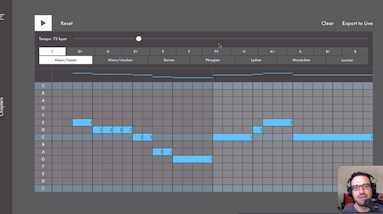
A Simple But Powerful Tool for Generating Ideas
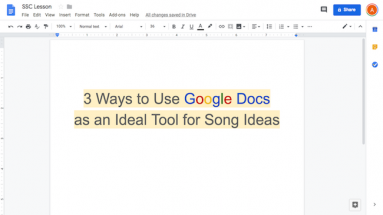
3 Ways to Use Google Docs as an Ideal Tool for Song Ideas
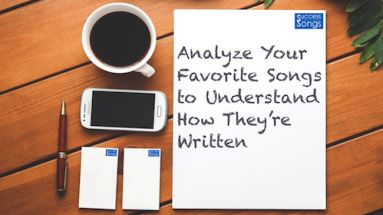
Analyze Your Favorite Songs to Understand How They’re Written
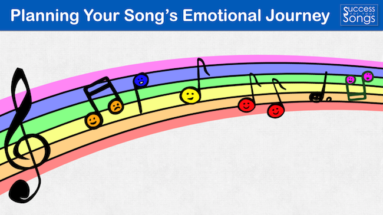
Planning Your Song’s Emotional Journey
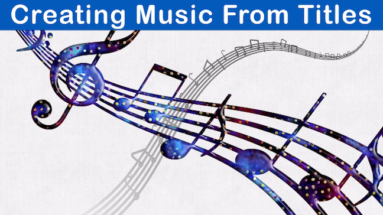
Creating Music From Titles
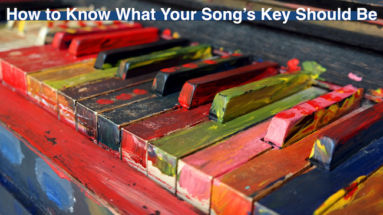
How to Know What Your Song’s Key Should Be
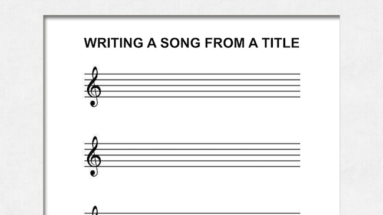
Writing a Song from a Title
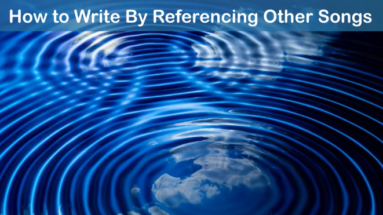
How to Write By Referencing Other Songs

Choosing a Perspective for Your Songs
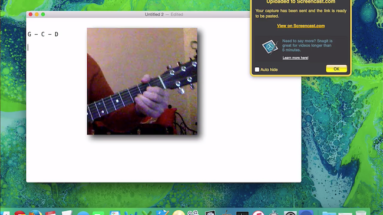
3 Ways for Organizing Your Song Ideas
Module 2: Chords and Melodies that Suit Your Ideas
This module discusses all the notes you choose and how to effectively tie them into your song’s idea. New lessons get added to this module periodically. Here are some of the lessons you'll find inside when you join us now:
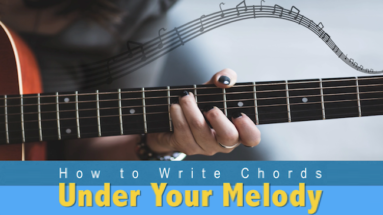
How to Write Chords Under Your Melody
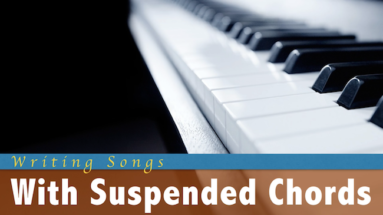
Writing Songs with Suspended Chords
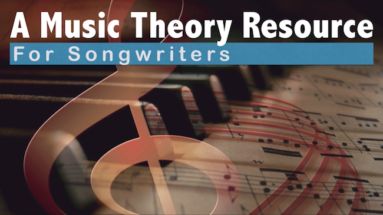
A Music Theory Resource for Songwriters
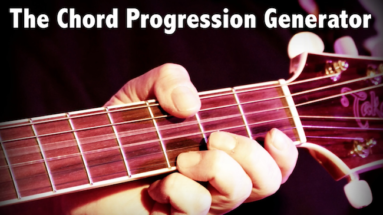
The Chord Progression Generator
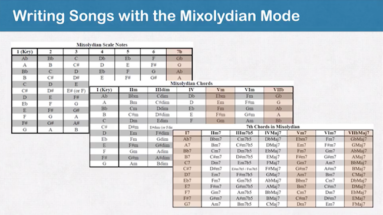
Writing Songs with the Mixolydian Mode
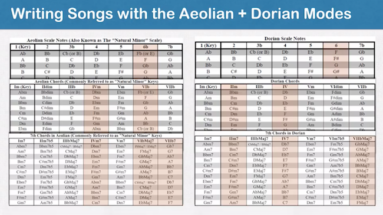
Writing Songs with the Aeolian and Dorian Modes
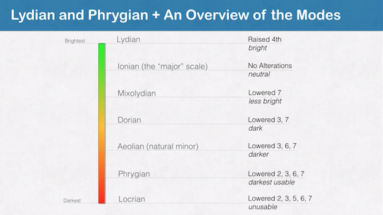
Lydian and Phrygian Modes + an Overview of the Modes
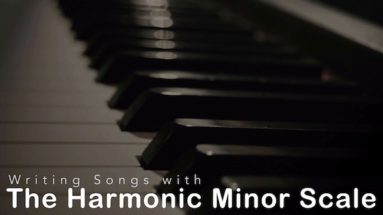
Writing Songs with the Harmonic Minor Scale
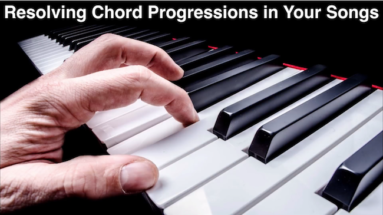
Resolving Chord Progressions in Your Songs
Module 3: Writing Relatable Words
In this module, you’ll learn detailed methods for writing emotional lyrics your listeners can relate to. New lessons get added to this module periodically. Here are some of the lessons you'll find inside when you join us now:

Creating Vivid Lyrics
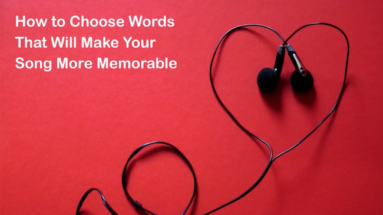
How to Choose Words That Will Make Your Song More Memorable
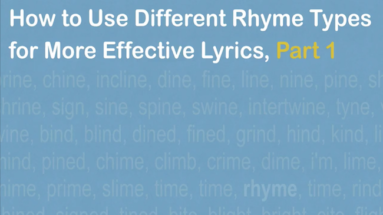
How to Use Different Rhyme Types for More Effective Lyrics, Part 1
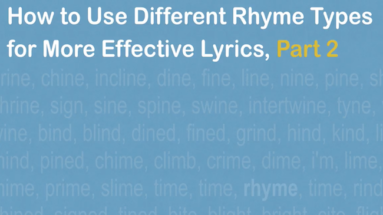
How to Use Different Rhyme Types for More Effective Lyrics, Part 2
Module 4: Constructing Your Song
In this module, we look at putting together the pieces of your song. We examine common songwriting “rules” which you can use, or effectively break for added creativity. New lessons get added to this module periodically. Here are some of the lessons you'll find inside when you join us now:
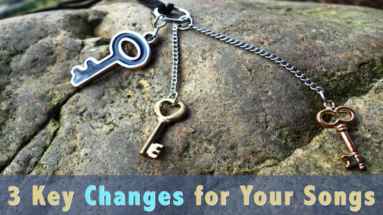
3 Key Changes for Your Songs
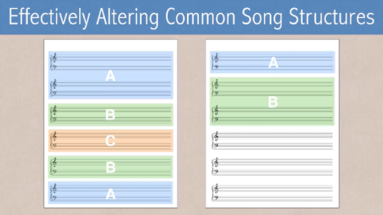
Effectively Altering Common Song Structures
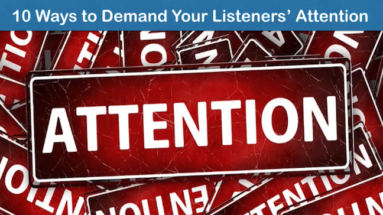
10 Ways to Demand Your Listeners’ Attention
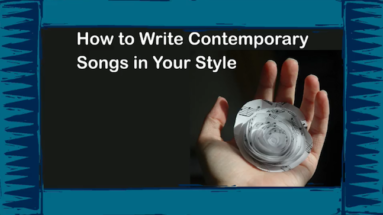
How to Write Contemporary Songs in Your Style
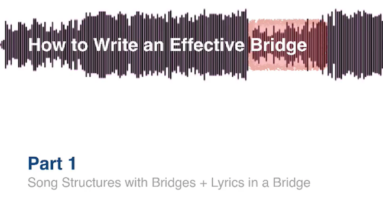
How to Write an Effective Bridge, Part 1
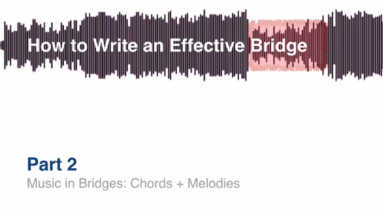
How to Write an Effective Bridge, Part 2
Module 5: Songwriting Advice from Professionals
This module is a series of interviews with songwriting professionals. They have differing backgrounds, giving you multiple, educated perspectives on writing music. New interviews get added to this module periodically. Here are some of the interviews you'll find inside when you join us now:
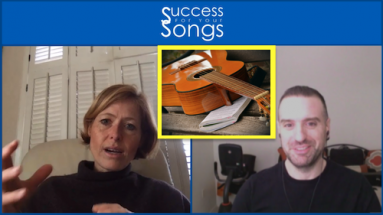
Songwriting With Intention with Popular Lyric Writing author, Andrea Stolpe
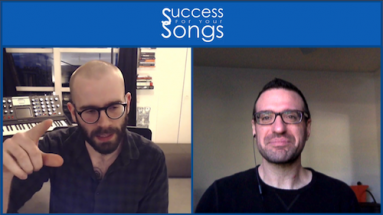
Writing Songs With Production in Mind with The Addiction Formula author, Friedemann Findeisen
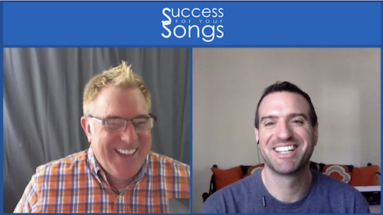
Creating a Great Song with Grammy nominated music educator, Shane Adams
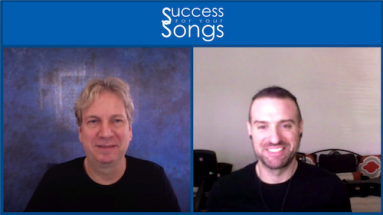
Mistakes to Avoid as a Songwriter with Songwriting Planet founder, Kevin Thomas
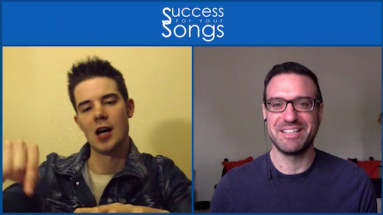
Are There "Rules" for Great Songs? with The Art of Songwriting author, Ed Bell
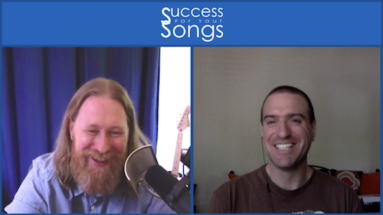
Songwriting Strategies with Logic Pro X for Dummies author, Graham English
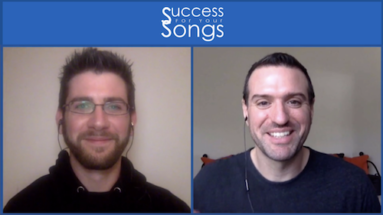
The Importance of Learning Music with Musical U's founder, Christopher Sutton
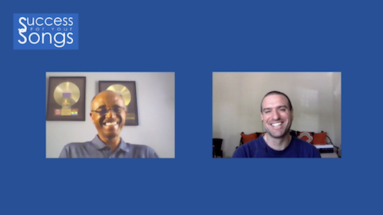
Hooks, Titles and Melodies with Motown Records songwriter, Clay Drayton
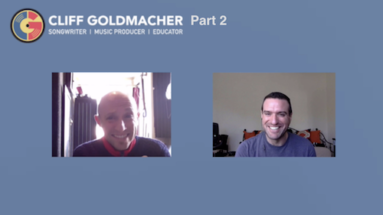
Writing Songs with Goals with former Nashville staff songwriter, Cliff Goldmacher
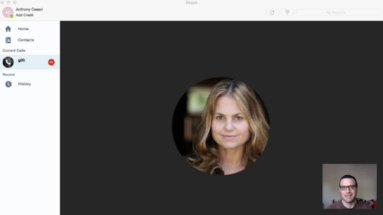
Tips and Ideas for Better Songs with The 360 Degree Songwriter author, Gilli Moon

Crafting Your Song with songwriter, Vance Gilbert
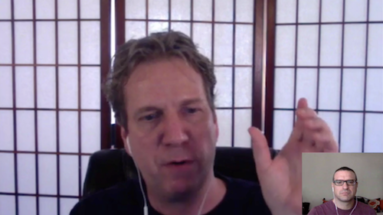
Writing Better Songs with Songwriting Planet founder, Kevin Thomas
Module 6: Sound Professional [Performance + Production]
After your song’s written, it needs to be presented well. In this module you’ll learn from professionals with differing backgrounds, giving you multiple, educated perspectives on performance and production techniques. New interviews and lessons get added to this module periodically. Here are some of the ones you'll find inside when you join us now:
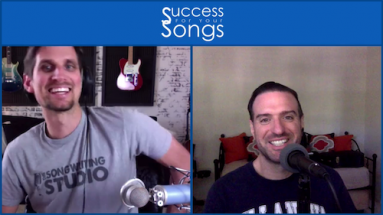
The Studio as Your Songwriting Tool with The Songwriting Studio director, Dean Davis
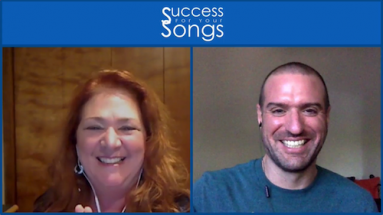
Creative Ways for Getting More Gigs with former American Songwriter magazine editor, Nancy Moran
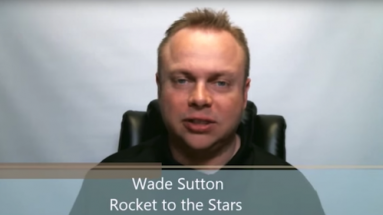
What to Say in Between Songs with the 6 Minute Music Business Podcast host, Wade Sutton
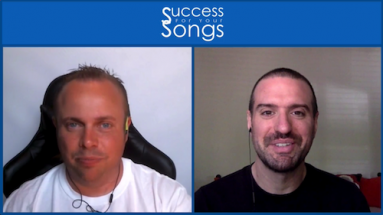
Giving Your Audience a Memorable Performance with the 6 Minute Music Business Podcast host, Wade Sutton

How to Perform Confidently for an Audience
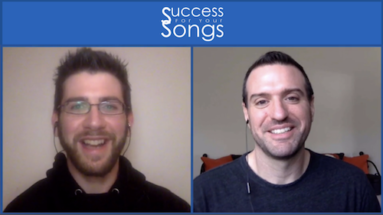
Practicing More Effectively with Musical U's founder, Christopher Sutton
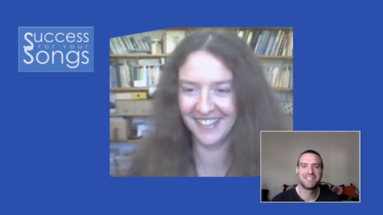
Improving Your Vocal Performances with Come Alive Singing founder, Selena Mara
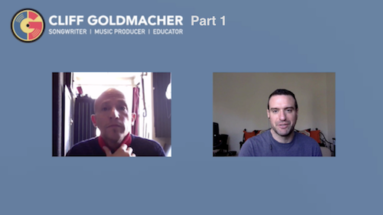
Creating and Promoting Demos with former Nashville staff songwriter, Cliff Goldmacher
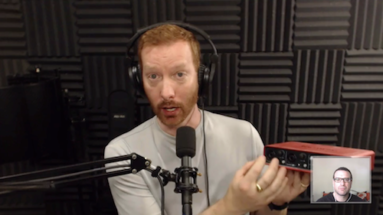
Getting Started with Home Recording with Home Music Studio 1's founder,
Dave Maxey
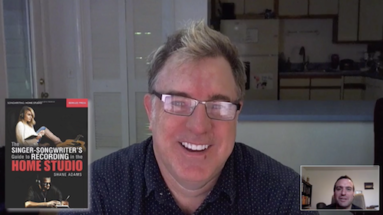
Home Recording for Singer-Songwriters with Grammy nominated music educator, Shane Adams
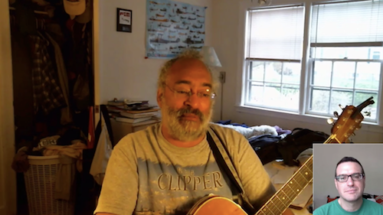
Giving Your Best Performances with songwriter, Vance Gilbert
Module 7: Marketing, Networking + Self-Help for Songwriters
Once your song’s recorded, it’s time to “get it out there.” In this module, you’ll learn from professionals with differing backgrounds, giving you multiple, educated perspectives on promoting your music and yourself. New interviews and lessons get added to this module periodically. Here are some of the ones you'll find inside when you join us now:
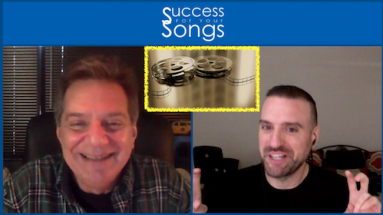
Film + TV Opportunities for Your Music with Taxi Music's founder, Michael Laskow
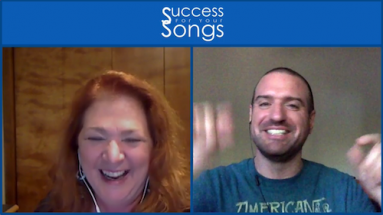
Getting the Right Mindset for a Successful Music Career with former American Songwriter magazine editor, Nancy Moran
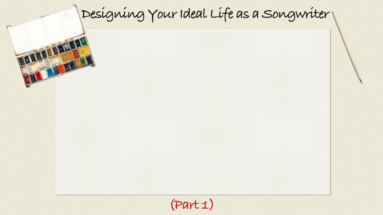
Designing Your Ideal Life as a Songwriter, Part 1
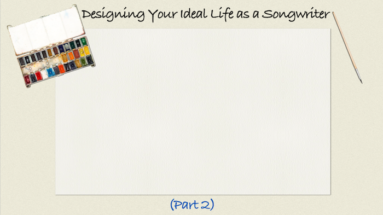
Designing Your Ideal Life as a Songwriter, Part 2
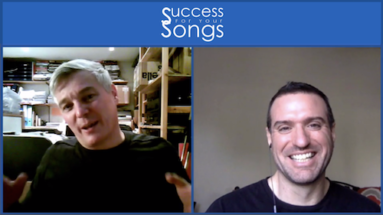
Deciding on Your Goals as an Artist with Make it in Music founder, Ian Clifford
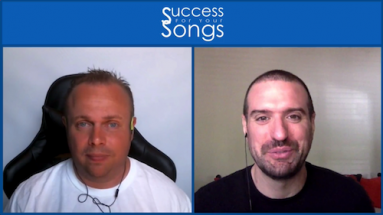
Branding Yourself as an Artist with the 6 Minute Music Business Podcast host, Wade Sutton
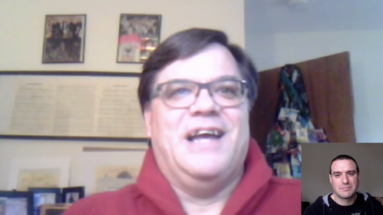
Developing Relationships in the Music Business with Music Starts Here founder, Doak Turner
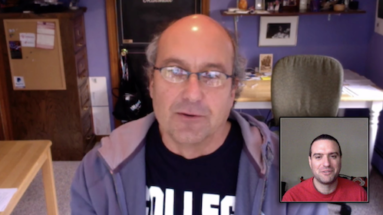
Furthering Your Music Career with Berklee Music Online founder and author of The Future of Music, Dave Kusek
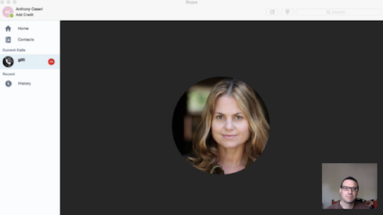
Music Marketing Strategies with The 360 Degree Songwriter author, Gilli Moon
5-Minute Quick Tips for Every Topic
Below are some of the 5 Minute Quick Tips waiting for you in the archive when you join us inside...
What’s More Important – Drive or Talent?
The Myth of Writer’s Block
Strategies for Writing Songs with Vocals for TV + Film – An Interview with Robin Frederick
Find Chords for Your Melody in ANY Key (A Sneaky Trick)
How Your Song Will Benefit from Feedback
Turn Your Lyric Ideas into Fascinating Stories
Concepts to Consider for Writing Great Songs – An Interview with Songwriting Professor, Keppie Coutts
An Easy Shortcut for Writing Chords Under a Melody
Understanding How to Use a Pre-Chorus in Your Song
Songwriting Strategies – An Interview with Songwriting Planet Owner, Kevin Thomas
Coming Up With Strong Song Titles
The Best Way to Make Your 1st, 2nd AND 3rd Choruses Impactful
A Great Free Tool for Writing Chords and Melodies
An Interview with a Berklee Songwriting Professor
Writing and Submitting Music for Film and TV Placements
15 Questions with Multi-Platinum Songwriter, Andrea Stolpe
Why You Should Write Simple Melodies
Are Your Songs Good Enough?
Creating an Emotional Journey with Your Lyrics
A Great Tool for Writing More Emotional Lyrics
Why Starting with a Title Can Greatly Improve Your Song
Easy Exercises for Improving the Most Important Part of Your Songs
How to Deal with Nerves When You’re Singing
A Great Trick For Writing Better Melodies
How Complete Should Your Song Demos Be?
Here’s the Value in Writing Songs Quickly
Resolving Chord Progressions
3 Quick Techniques for Memorable Lyrics That Attract Listeners
What to Consider When Choosing a Song Structure
Write Stimulating Melodies for an Impactful Song (Not Just the Chorus)
How to Come Up With a “Big Idea” for Your Song That Will Interest Your Audience + Eliminate Writer’s Block
How to Hear Your Song with Fresh Ears So You Can Make the Right Decisions
Use a Title to Create a Full Song
Writing Melodies WITHIN a Section (e.g., a Verse or Chorus)
Songwriting with Chord Families – A Quick and Easy Way to Get Fresh Sounds
Why Writing Your Hook First Will Create Your Best Songs
What’s the Best Key for Your Next Song? (With Example)
Easy Ways to Consistently Come Up with Strong Song Ideas
A Simple Method for Writing Words to Music (Your Lyrics May Sound Wordy if You Don’t Do This)
Singing With More Emotion
Why Using a Rhyming Dictionary Will Make You a Better Lyricist
What to Know About Recording a Demo vs. a Master
Hit Songwriting Example: A Twist That Adds Excitement to a Typical Song Structure
How to Make Bland Lyrics More Relatable in the Next Song You Write
How to Write Lyrics People Will FEEL So They’ll Relate to Them
Writing Titles That Generate Interest in Your Songs
When to Use a Bridge in Your Song (a Good Rule of Thumb)
How to Write Lyrics in a Way That Will Make Your Audience Listen to Every Word
How to Use a Pre-Chorus to Effectively Set Up a Chorus
How to Write a Chorus That Attracts Listeners
3 Parts of an Impactful Vocal Practice
A Quick Exercise for Shattering Writer’s Block
The Most Important Things to Consider When Setting Up Your Recording Space
How to Write Words to Music (While Keeping Your Melody Singable)
Singing With More Power in Your Voice
The Fastest Way to Create Engaging Melodies
3 Things to Know for Writing Captivating Melodies
How to Easily Organize Your Song Ideas
An Example of a Strong Song Title and Why It Works
Easily Make Overused Metaphors New Again
How to Double Your Vocals So They Actually Sound Good
One of the Most Important Distinctions to Know for Professional Sounding Vocals
4 Songwriting Practice Tips You Already Know But Aren’t Doing
A Cure For Writer’s Block
Finding Chords that Match Your Lyrics for a Meaningful Song
What Elements Make a Song Great?
What You Need to Record Your Songs at Home Is Easier (and Cheaper) Than You’d Think
Improve Your Song’s Bridge With These Easy Approaches
Treasure in the Rainbow: How to Contrast Your Sections
A Case Study on “I Won’t Give Up” by Jason Mraz
Advancing Your Story With Your Lyrics
A Simple Change That Can Make Your Music AND Lyrics More Meaningful
Should You Record at Home or in a Pro Studio?
Your Music is Recorded… Now What?
A Quick Way to Get Inspired to Write a Great Song
A Powerful Trick for Writing Singable Melodies
Why Starting Your Melody on Different Beats Benefits Your Song
Stop Holding Yourself Back From Writing Incredible Music
Writing Emotional Lyrics For Your Song
A Technique You’re (Almost) Already Using For Writing Mind-Blowing Songs in Your Own Style
A Sneaky Trick for Singing Your Own Backing Vocals
How One Line in Your Lyrics Can Keep People’s Attention Throughout Your Song
Using “Shapes” to Write Melodies
6 Melodic Shapes for Writing Singable Melodies
How to Write a Chord Progression in Any Style
Using Rhyme to Group Similar Ideas
A Songwriting Trick from a #1 Elvis Song That Has Nothing to Do With Lyrics, Melodies or Chords
What You’ve Wanted to Know About Copyrighting Your Songs
Are You Talking to Me? A New Perspective on Lyric Writing
Are You Writing Bad Songs? (Here’s Why You Should…)
An Easy Technique You Learned in Grade School for Writing Memorable Lyrics
2 Different Ways Your Songs Can Be Used in TV and Film
How to Practice So You’ll Improve
Writing Lyrics That are Open to Interpretation
How to Make the Most of Your Live Performances
How to Use Falsetto in Your Singing
How to Use CDs and Business Cards at Music Networking Events
A Mistake Often Made When Using Reverb
Organizing Your Song Ideas
Important Concepts to Keep in Mind When Writing Melodies
What to Know When Writing a Melody Over Chords
Getting People to Open and Read Emails About Your Music
A Clever OneRepublic Melody Writing Example
How to Choose Notes for Your Chorus
How to Use Autotune as a Songwriting Tool (In Ways You Wouldn’t Expect)
How to Rewrite Your Lyrics Effectively
Writing Lyrics That are Melody Ready
How to Implement Systems to Be a More Professional Artist
Why Finishing ALL of Your Songs is Important
Why Hard Work Trumps Talent in Songwriting
The Benefits of Co-Writing Songs
The Importance of Accepting Rejection and Getting Feedback on Your Songs
Verse Ideas
Performance Tips from a Live Music Producer
How to Listen to Other Songs to Grow as a Songwriter
Easy Melody Writing Tricks
Making Your Lyrics Fit Your Melody
Title Writing Tips
How to Use an Electronic Press Kit and Why You Need One
How to Grow as a Performing Songwriter
7 Tips to a Great Vocal Performance
The Importance of Writing Melodies Before Chords
What the Heck is Uncle Shane’s Famous Perpetual Top 5 Song List?
Do Your Lyrics Need to Be Autobiographical?
The Use of Clichés in Songwriting
The Sister Mary Elizabeth Rule of Songwriting
The Creative Songwriting Webinar, Part 2: Critiques
The Creative Songwriting Webinar, Part 1: Techniques
How to Use 7 Free Songs to Build Your Fan Base
How to Highlight Your Best Lyrics (and Why It’s Important)
Do Music Lessons Block or Enhance Your Creativity?
Combining Online Music Marketing with Playing Live
How To Write a Better Bio For Your Website
Eliminating Mistakes From Your Performances
Writing Lyrics Your Listeners Can Easily Relate To
A Short But Powerful Tip For Success in Songwriting
Improve Your Lyrics With This Easy Exercise
Why Co-Writing is a Good Idea
4 Things NOT to Do in an Email to a Music Industry Professional
What You Need to Know About Getting Your Music on TV and in Films
How Taylor Swift Built Her Fan Base (Strategies You Can Use)
4 Steps to Writing 10x More Music This Year
Should You Record Your Music Yourself? (The Answer You’ve Been Looking For)
A Sneaky Technique for Writing Refreshing Melodies
How To Write Songs For TV And Films
Bring Your Lyric Theme to Life
3 Crucial Whys & Hows To Get Out of Your Songwriting Comfort Zone
How to Layer Multiple Meanings Into Your Lyrics (A Case Study)
Should You Close Your Eyes When Performing?
How to Get Your Listeners More Interested in Your Lyrics
How To Build An Audience For Your Songs Through Blogging
10 Foolproof Ways To Critique Your Own Songs
7 Things You Can Do Today To Move Your Music Career Forward
3 Co-Writing Tips For Songwriters
How to Stop Forgetting Your Lyrics
How to Use Technique AND Inspiration When Writing a Song
Do You Know How to Protect Your Vocal Cords and Keep them Healthy?
3 Important Tips For Submitting Your Music to Industry Professionals
How to Talk to People to Make Them Your Fans
Five Career-Endangering Networking Mistakes And How To Avoid Them
A Must-Use Tool For Writing Choruses
Write in a Genre: Your Key to Commercial Success
Productive Repetition in Lyric Writing
A Music Business Plan For The Independent Musician
Moving Past the Lyrics and Into the Story
3 Important Melody Writing Concepts
The Only Rule in Songwriting
How To Create Contrast In Your Melodies
How Your Melodies Are Affected By These 5 Aspects of Your Vocal Delivery
How Do You Stack Up Against The Average Indie Musician?
Using the Universal Human Experience in Your Songwriting
Copyrighting Your Music, Part 2: How to Do It
Copyrighting Your Music, Part 1: Should You Do It?
Six Ways To Motivate Yourself To Write Songs
You Don’t Have to Be Local to Succeed in Music
How to Easily Write a Strong Melody
How to Plan Out Your Song
How to Maximize the Meaning of Your Lyrics
An Effective Opening Line
The Magic of Fusing Your Words to Your Music
How to Use Grammar in Your Songs
Using Falsetto to Color Your Melodies
Using a Pivot Line in Your Lyrics
Writing A Captivating Song Title
The Power of Good Lyrics
Ending Your Song With a Punch Line
The Rule of Two’s
Make Your Song Timeless
Writing Lyrics to a Rhythm
A Simple, But Interesting Melody Idea
Speeding Up Your Melody and Lyrics
How Long Should Your Song’s Intro Be?
How To Make Your Chorus Stand Out
Object Writing
How to Tie Your Lyrics to the Mood of Your Song for a Great Listening Experience
Understanding the AABA Song Structure
How to Keep Your Lyrics Conversational So People Will Listen to Them
Connect Your Words to Your Music for an Effective Moment in Your Song
How to Avoid Having Your Lyrics Misheard
Write Melodies that Will Demand the Attention of Your Listeners
Using Rhyme to Change Expectations in Your Song
Writing Melodies with the Minor Pentatonic and Minor Blues Scales
Make Your Listeners Want to Hear Your Song Again and Again
Common Song Structures and Why to Use Them
Something to Try if You’re Running Low on Song Ideas
Increasing Your Song’s Marketability: When in Doubt, Make No Sense
Three Ways to Write Great Melodies
Covering a Song in Your Style
The Do’s and Don’ts of a Songwriter’s Email List
Engage Your Listeners with Your Opening Lines
Stop Forgetting Your Lyrics When You’re Playing Live
Aggressive vs. Calm & Everything in Between: Using Tempo as a Tool
The Benefits of Using a Rhyming Dictionary
How Specificity in Lyric Writing Can Improve Your Songs
Three Tips For Marketing Your Music
A Cool Way To Break Your Heart: A Case Study on “Fidelity” by Regina Spektor
Turning Cliché Metaphors into New Ideas: A Case Study on “Breakeven” by the Script
What A Producer Does & Why You Should Consider Using One
Don’t Blow Your Cover: A Case Study on a Cover Version of “Immigrant Song”
Rhyme as an Accelerator: A Case Study on “Heart of Gold” by Neil Young
The Five P’s for Success as a Songwriter
The Third Time’s a Charm: Bending the Rules on Song Structure
It’s the End of the Verse as We Know it (And I Feel Fine)
Songwriting Lessons Learned From a Hit Pop Song
Eliminating Stage Fright From Your Performances
Write Like We’re Speaking: A Study on Phrasing
Don’t Rhyme All the Time (And Other Things Not to Do)
Five New Year’s Resolutions for Guitar Players
How to Make a BIG Difference in Your Shows in the New Year: Take More Risks
Grohl’s Emoting Vocals: A Case Study on Foo Fighters’ “Monkey Wrench”
Four Ways to Attract More Music Fans Faster
Breathe & Release: A Case Study on Ingrid Michaelson’s “Keep Breathing”
Lessons Learned From a Week With John Mayer
Ambiguity in Lyric Writing: A Case Study on Kings of Leon’s “Use Somebody” (Part 2)
Ambiguity in Lyric Writing: A Case Study on Kings of Leon’s “Use Somebody” (Part 1)
One of These Days, Songwriters Will Get This Concept Right: A Case Study on Foo Fighters’ “These Days” (Part 2)
One of These Days, Songwriters Will Get This Concept Right: A Case Study on Foo Fighters’ “These Days” (Part 1)
Moving Your Lyrics Forward: A Case Study on John Mayer’s “Daughters”
Using Vocal Range in Your Songwriting: A Case Study on Katy Perry’s “Firework”
Implement What You're Learning: Song Critiques
A Module in Your Members Site, the Songwriting Success Circle
Below are some of the critiques waiting for you when you join us inside...
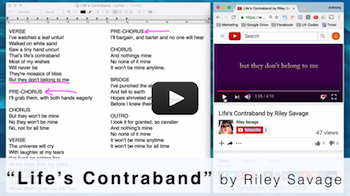
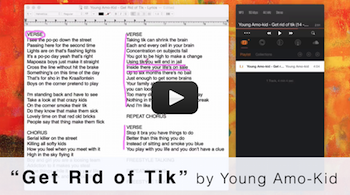
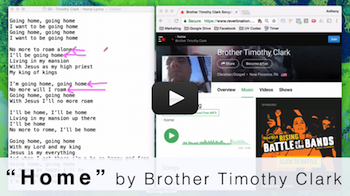
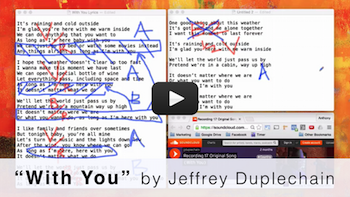
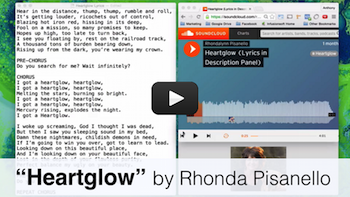
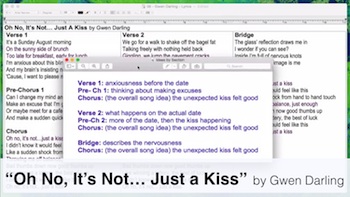
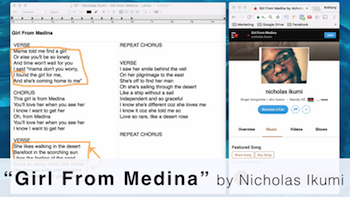
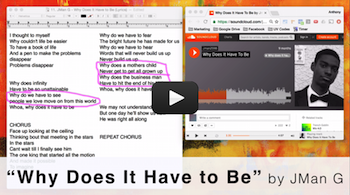
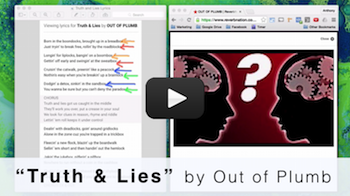
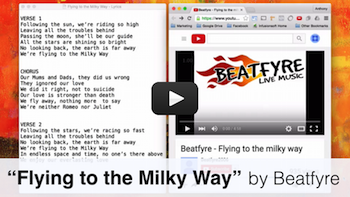
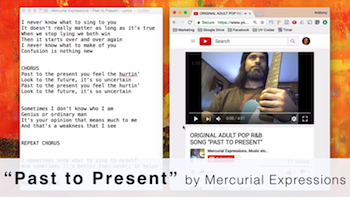
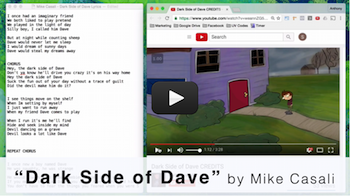
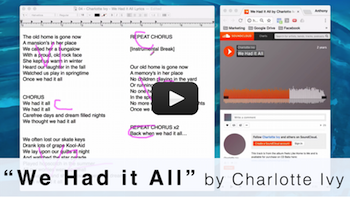
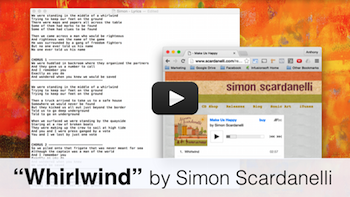
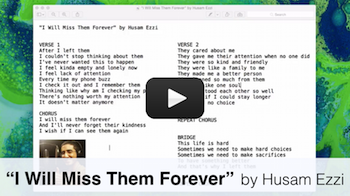
Get Your Songwriting Questions Answers: Q&As
A Module in Your Members Site, the Songwriting Success Circle
Have a Songwriting Question You Want Answered?

As a member of the Songwriting Success Circle you have the opportunity to submit your songwriting questions to me, which I answer in videos that get posted to their own module.
If there's anything you feel I missed in the other modules, we'll cover it here.
Below are just some of the songwriting questions I've answered in the Q&A videos so far...
- How do you know if your songs are worth recording?
- What key’s the best to write in?
- How do you weigh heart and emotion vs. architecting a song?
- What’s better: writing lyrics or melody first?
- How many half steps up should it be for the key change at the end of a song?
- Why should I put effort into lyric writing?
- How long does it take to be a great songwriter and how do you get there?
- How do you set already written lyrics to music?
- Can you break the rules of common song structures?
- Are lyric writing rules universal to any language?
- Should you use direct language in lyric writing?
- How do you make your verse, chorus and bridge sound different from each other?
- What should I consider when writing chord progressions?
- Every melody I write sounds like an existing song. How can I avoid that?
- How can I craft a title from an idea and make it singable in the chorus?
- How should you approach the intro to a song?
- How do you find a chord progression for a written melody?
- How do you write a great melody that will be remembered?
- Are my personal experiences universal enough for other people to relate to?
- When you come up with a line in your head, how do you know if it should be the chorus or the verse?
- What's the best way to set up a payoff, or surprise ending, in a story song?
- What can you do if you find all your melodies sound similar?
New Content Added Several Times Per Month!
New Videos are Added Frequently!
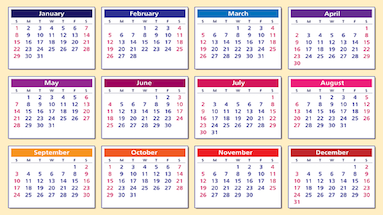
The Songwriting Success Circle is not a stagnant course. In addition to ALL the content described on this page, you also have access to the new in-depth lessons, interviews, critiques, Q&As, AND 5-minute quick tips that are frequently added as the site continues to grow!
As you keep improving as a writer, this new content is posted so you'll always have the latest and best methods for coming up with and developing song ideas. Easily compete with the thousands of other songs fighting for your listeners' ears when you always have the right resources on your side.
Easy Reference Chord and Melody Writing Charts
A great way to generate ideas is by having all the chords and melody notes in front of you to experiment with.
Below are some of the charts you’ll have access to when you join us inside…
Get Chord and Melody Ideas from Your Reference Charts
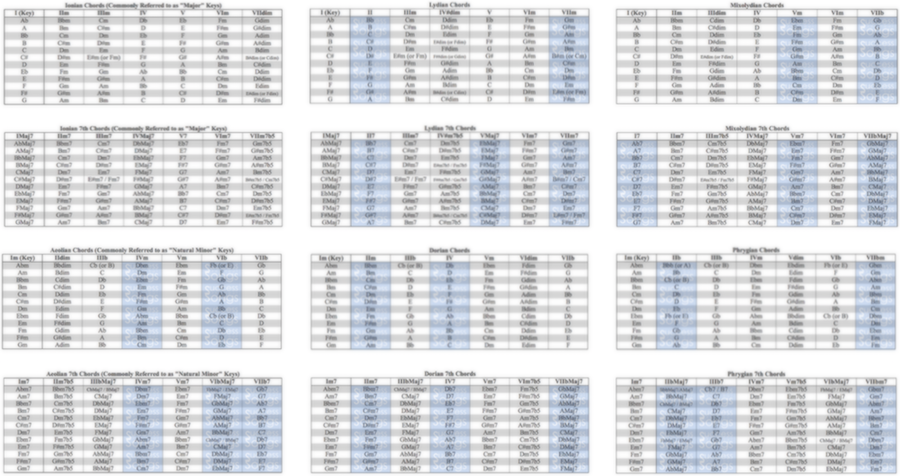

- Easy to Reference Layout
With all of these charts in one convenient place in the members area, you can easily experiment with chord progressions and melodies in different modes to generate an endless amount of song ideas.
And not only will it get you the right sound for your song, but it’ll save you a lot of time when you’re writing, since you’ll have all the information you need right in front of you.
- Each Chart Has Every Song Key in That Mode
Within each of the modes, these charts provide every key available within that mode. So not only will you choose the right mode for your song, but by choosing the right key, you’ll have a song that fits comfortably in your vocal range, and is easy for you to play on your instrument. This will give you your best vocal and instrumental performances, which are both crucial for creating songs people want to hear.
- Corresponding Lessons for Each of These Charts
All the charts in the members area have corresponding lessons that will show you how to use them, so you'll be able to reference these charts with ease. So if you’re not sure about how to use these different chord or melody charts, or if you don't know what the modes mean or how they’ll benefit your music... don’t worry, you can easily find out in a related lesson!
- The Only Place You'll Find All These Resources Together
You won’t find a comprehensive easy-to-use resource like this on other sites, so give your music an edge over songs written by writers that don’t have quick and easy access to this information.
In Addition to the Charts Above, You Get These Too...
Find the Right Musical Emotion for Your Song Ideas
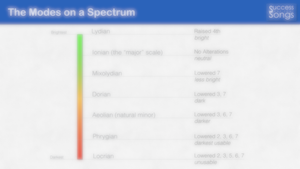
This chart will help you choose the right chord and melody notes for an emotion you want to evoke in your listeners. It gives you several options on a spectrum from brightest sounding to darkest sounding. Since happier songs tend to have brighter sounds and gloomier songs tend to have a darker sound, you'll know which chord and melody notes will best suit your song ideas in a quick visual reference.
More Chord and Melody Options: Harmonic Minor
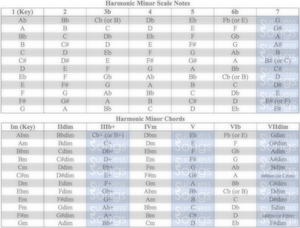
There's also 2 chord and melody charts for the harmonic minor keys, in case all the other chord and melody charts mentioned above still aren't helping you coming up with the right song ideas.
These 2 charts also outline all the harmonic minor keys available (for example, F harmonic minor, B harmonic minor, etc). By choosing the right key for your song idea, you’ll have a song that fits comfortably in your vocal range, and is easy for you to play on your instrument. This will give you your best vocal and instrumental performances, which are both crucial for creating songs that people want to hear.
And if you’re not sure about how to use the harmonic minor chord or melody charts, or what the harmonic minor is, there's a corresponding lesson that will show you that in detail. This way you'll be able to reference these charts and write songs with them with ease.
The melody chart even has guitar tablature for the harmonic minor scale, so you can effortlessly play it on your guitar too if that helps you write with it.
Generate Song Ideas with Tension in Them

Suspended chords are a great opportunity to create tension in your music. And how you release that tension can tie strongly into what your song is about while keeping your audience engaged with what they're listening to.
As a result, suspended chords can be a great way to conceive song ideas with a sense of longing, ambiguity, resolution, or to add embellishment. They'll add a lot of character to your music in a way that ties into your concept and engages your listeners.
That's why this chord chart lays out all the suspended chords for you in an easy to reference way. It even provides guitar tablature to make the chords simple for guitar players to add to their songs.
If you’re not sure about what makes a suspended chord, there's a corresponding lesson that will show you that in detail. It gets in-depth about how to use these chords in your music, so you can quickly generate ideas that evoke the emotions you want your listeners to feel.
The Ultimate Chord Progression Idea Generator
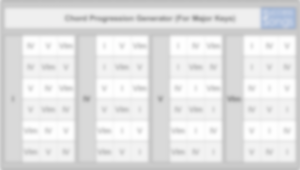
This chart lets you quickly derive chord progressions based on the most common chords. It gives you 24 chord progression combinations, but you can also make alterations to the chart (which are outlined for you), giving you dozens more options to choose from.
This makes it easy to quickly choose a chord progression for your verse, another for your chorus, and a third for your bridge, so your song has contrasting changes throughout, keeping your listener engaged.
There's also a corresponding lesson in the members area that will show you how to use this chart in detail, so you can use it to generate chord progressions for every section of your song almost instantaneously.
Chord Family Chart: Write More Creatively
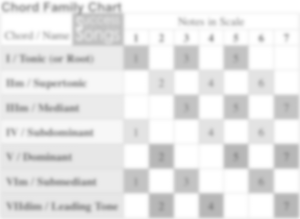
You'll love this chart if you find yourself using the same chords over and over again. You'll now be able to substitute a chord for a different one that has a related sound, so you can to write interesting and creative chord progressions, without feeling like you’re always using the same ones.
There's also a lesson that discusses the chord families in-depth and will show you how to use this chart, so you'll be writing more creative chord progressions in no time.
Song Analysis Worksheet: Understand Your Favorite Songs
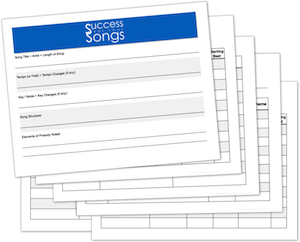
Simply listening to the music you love isn’t enough for you to have a deep comprehension of how it was written. But understanding how your favorite songs are written is a great way to learn songwriting, come up with a plethora of ideas, and write better music.
The Song Analysis Worksheet will reveal to you the chords, melodies, lyrics, song structure, key, and other elements of any song you want to learn from, so you can flow with ideas you would have never thought of on your own.
There’s also a lesson that walks you through how to use this worksheet in detail, so you can get inside the brain of any artist you have an appreciation for, right away.
Rhyme Types on a Spectrum: Find the Right Emotion
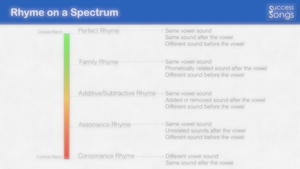
Different rhyme types create stronger or weaker connections with each other. As a result the type of rhyme you choose can contribute to the emotion of your lyrics.
This chart will help you find the right rhyme for the emotion of your song, by laying out the different types of rhymes on a spectrum from strongest to weakest connection, so you can use the type of rhyme that’s appropriate for the mood of your song.
There’s also a lesson that discusses the strength of the different rhyme types comprehensively, so you’ll thoroughly understand each one and can use this chart to have your rhymes reflect your song's emotions right away.
What Songwriters Who've Already Joined Are Saying...
Take a look at some of the comments by our members, so you can get an idea for how much your songs are about to improve.
These were all posted on the videos waiting for you inside the Songwriting Success Circle...








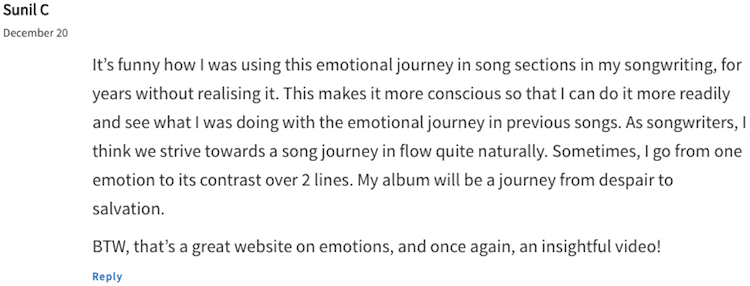






































Also, these were answers Songwriting Success Circle members gave to an online survey about the site...









...and YOUR songs are about to improve in all these ways too when you join us today!
What's it Worth?
If you were taking ONE online class, it would probably cost you over $1,000 for just 3 or 4 months. That’s at LEAST $250/month! Yikes!
And if you were taking lessons, they’d probably cost you at LEAST $35/hour, per LESSON. That’s about $150/month (if not more) for 4 measly lessons!
But with the Songwriting Success Circle you’re getting SO much more than just a few lessons and I’m not going to charge you even close to $250 or $150/month. I’m not even going to charge you half of that! (Although, even if I did, it would be worth every penny)

30 Day 100% Money Back Guarantee
So you can see how serious I am about everything I’ve told you about the members site, take 30 days to go through the material so you can put everything into action and see if it does everything I said it would for you.
If you’re not satisfied for any reason, no worries — just send me a quick message within 30 days from your initial purchase and you’ll get every penny of your money back. No questions asked.
This way the Songwriting Success Circle either delivers to you everything I promised it would, or it costs you nothing.
And with your access to the Songwriting Success Circle, you get immediate access to every single lesson, interview, song critique and newsletter I’ve posted since the site was launched. And new content is added consistently, so the information is constantly being updated. Also, by being part of our members site, you get to be part of a community of like-minded songwriters.
Remember, if you keep doing things the same way you’ve been doing them, you’re going to get the same results you’ve been getting. With The Songwriting Success Circle, you’ll be continually getting new information you can apply to your songs to be a great songwriter. So try it out for a few days to see if it’s for you. After all, it’s completely risk free, so there’s absolutely nothing to lose!

Contact
If you have any additional questions about this course, please feel free to email me at: anthony@successforyoursongs.com
Terms of Use
In accordance with FTC guidelines, we want to make it clear that the customer testimonials we’ve received are based on the unique experiences and circumstances of the people who have submitted them. We cannot promise that you will experience similar benefits from using our product. We can not and do not make any guarantees about your ability to get results or earn any money with our ideas, information, tools, or strategies.
What we can guarantee is your satisfaction with our training. We give you a 60-day 100% satisfaction guarantee, so if you are not happy for any reason with the quality of our training, just ask for your money back.
All products and services by our company are for educational and informational purposes only. Nothing on this page, any of our websites, or any of our content or curriculum is a promise or guarantee of results or future earnings, and we do not offer any legal, or other professional advice. You alone are responsible and accountable for your decisions, actions and results in life, and by your registration here you agree not to attempt to hold us liable for your decisions, actions or results, at any time, under any circumstance.
Furthermore, by purchasing How to Write Songs That Sell and/or the Songwriting Success Circle, you agree to the following:
- You will use this product for your personal and private use only
- It may not be resold, repackaged or otherwise transferred
- Bonus materials may not be duplicated or distributed in any way without permission
- Success For Your Songs retains all rights to How to Write Songs That Sell, the Songwriting Success Circle and and any additional content they come with
- All free content provided by SuccessForYourSongs.com may not be freely distributed without permission from the site owner
Privacy Policy
We respect your privacy, and will never sell, rent, trade or give away any of your personal information from our site to any outside party. We hate spam just as much as you do.
The only email sent from our website is in response to an inquiry that you may send us, or as a result of joining our opt-in email list. Should you opt-in to our mailing list, an unsubscribe link will be provided at the bottom of every one of our emails.
If anything comes to your attention which could potentially be a violation of this policy, please let us know immediately so that we can investigate and try to correct it.
Member Login
If you're currently a member of any of our online courses, you can login to access your material here: http://successforyoursongs.com/report/login/

